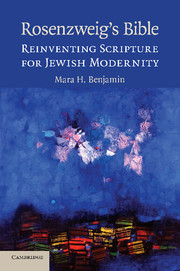Book contents
- Frontmatter
- Contents
- Acknowledgments
- Introduction: The Decline and Renewal of Scripture
- 1 Scripture in The Star of Redemption
- 2 Yehudah Halevi: The Creation of a Scriptural World
- 3 Bible Translation and the Shaping of German Identity
- 4 Toward a New Encounter with the Bible
- Conclusion: Scripture Today – Some Considerations
- Works Cited
- Index
3 - Bible Translation and the Shaping of German Identity
Published online by Cambridge University Press: 01 July 2009
- Frontmatter
- Contents
- Acknowledgments
- Introduction: The Decline and Renewal of Scripture
- 1 Scripture in The Star of Redemption
- 2 Yehudah Halevi: The Creation of a Scriptural World
- 3 Bible Translation and the Shaping of German Identity
- 4 Toward a New Encounter with the Bible
- Conclusion: Scripture Today – Some Considerations
- Works Cited
- Index
Summary
In the five years leading up to his death at the age of forty-two, Franz Rosenzweig devoted his waning energy to translating the Bible into German. It was a project for which, as he saw it, The Star of Redemption, Hymns and Poems of Yehudah Halevi, and his work at the Lehrhaus had been propaedeutic. Rosenzweig's perception of the Bible translation's importance explains his unabashed delight at its generating, as he wrote with glee, “offense” and “insult” unlike that of any other work he had produced. His pride stemmed from another source as well. He believed he had undertaken a project that was vital to the regeneration of the language, culture, and society of Germany. He aimed to do nothing less than to demonstrate the hidden Hebraic foundation of German arts, letters, and thought. The translation of the Bible into German that resulted from this effort simultaneously posited the essential contribution of Judaism to German culture and challenged the political and social agenda of classical ethical monotheism with an insistence on the difference of the Jewish contribution to and place within German culture.
Since the Enlightenment, the politics of scripture had dovetailed with the politics of integration: Jewish translations and interpretations of their Bible in German culture were always undertaken with an awareness of how the results might influence the debate about Jewish participation in the civil sphere. It was a fundamentally ambivalent enterprise.
- Type
- Chapter
- Information
- Rosenzweig's BibleReinventing Scripture for Jewish Modernity, pp. 103 - 134Publisher: Cambridge University PressPrint publication year: 2009



